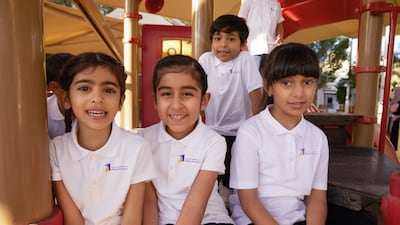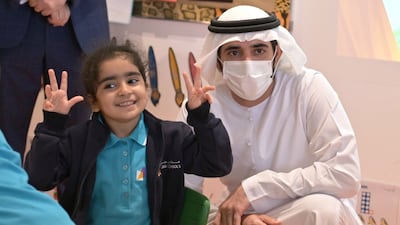The UAE's new education ministers have set out a plan to overhaul government-run schools, with investment in teachers and far more parental involvement in how children are taught.
There will be a renewed focus on maths and science taught in English from a young age, ministers said at a media briefing in Dubai.
Sarah Al Amiri, Minister of State for Public Education and Future Technology, said the ultimate aim is that the changes benefit every pupil in public schools across the country.
“We have three main priorities," she said.
"Firstly, our priority is to ensure the learning outcome of every public school pupil at every level.
"Secondly, it's the teachers, teachers, teachers. They are the foundation to build a good education system and are needed at all levels.
the Minister of Education
"And, thirdly, it is the leadership team that supports teachers and pupils. They can ensure the proposed changes will be carried out effectively."
Public schools are primarily for UAE citizens but they also accept some children of residents.
A trained scientist, Ms Al Amiri is the chairwoman of the board of directors of the Emirates Schools Establishment, which runs publicly owned schools.
“This generation will face many challenges whether at school or during their professional life and we need to support them not just by equipping them with knowledge but also with the right tools and innovative thinking," she said.
"They need support to keep abreast with the current changes."
Last week, the government said 10 schools would be taken over by private operators.
Ajyal Schools, or Generation Schools, will be operated by leading private sector education groups Taaleem, Aldar Education and Bloom Education, and serve about 14,000 pupils nationwide.
All 10 schools will be in the Northern Emirates and will switch to the American curriculum.
Within three years, 28 schools will be run under this public-private partnership.
New model of government schools - in pictures
“Like any educational system around the world, we don’t have one educational system or one school model or one method of teaching for the entire country," Ms Al Amiri said.
"At the end of the day, it has to be a system that matches the current requirements, the pupils' learning capacity, aspirations, and outcomes."
At the Generation Schools, "the same curriculum will be taught, the same learning outcomes will be required but it will be delivered in innovative and different ways according to current trends and needs,” she said.
Core subjects will also be taught in English at an early stage for the first time.
“The curriculum is there but the biggest challenge was the teachers and there was also the question of the medium of teaching," Ahmad Al Falasi, the Minister of Education, told The National.
"If you are teaching subjects such as maths and sciences in English, then you are increasing their exposure to English.”
He said these subjects were taught in Arabic when the children were young and English was introduced at a later stage.
“The current stage requires serious work in order to strengthen and enhance the education in the UAE," he said.
"Our aim is to achieve radical transformations in line with the future national strategies and plans.
"We are keen to form a clear vision about the present and the future of education, and link it to the Sustainable Development Goals to ensure we have qualified pupils."
The new structure is led by the Education and Human Resources Council, Federal Authority for Quality of Education, the Ministry of Education, the Federal Authority for Early Childhood Education, the Emirates Schools Establishment, in addition to the local education authorities in each emirate.
“We are committed to re-evaluating the quality of services, and providing a system that achieves rapid response, and best levels of achievement,” said Mr Al Falasi.
Parents will also be encouraged to take an active role in their child’s education.
Ms Al Amiri said that they were studying a “mechanism” that allows parents to be directly involved in their children's progress at school.
“Besides teachers, we also want parents to be involved in the decision-making process," she said.
"At the Ajyal Schools, all the parties involved are partners in the educational process. The pupil is a partner and the parents are strategic partners. The role of a parent is crucial, particularly in the early years."
A unified framework will also be applied to government kindergartens and preschools.
Sara Musallam, Minister of State for Early Education and chairwoman of the Federal Authority for Early Education, said: “While working on a new generation of learners, we need to lay the supporting foundations to empower pupils in their education journey, from the early years.
“We will co-ordinate with all concerned authorities to prepare a unified regulatory framework, which will be applied to more than 600 nurseries, all kindergartens and preschools of public and private schools in the UAE.”




























